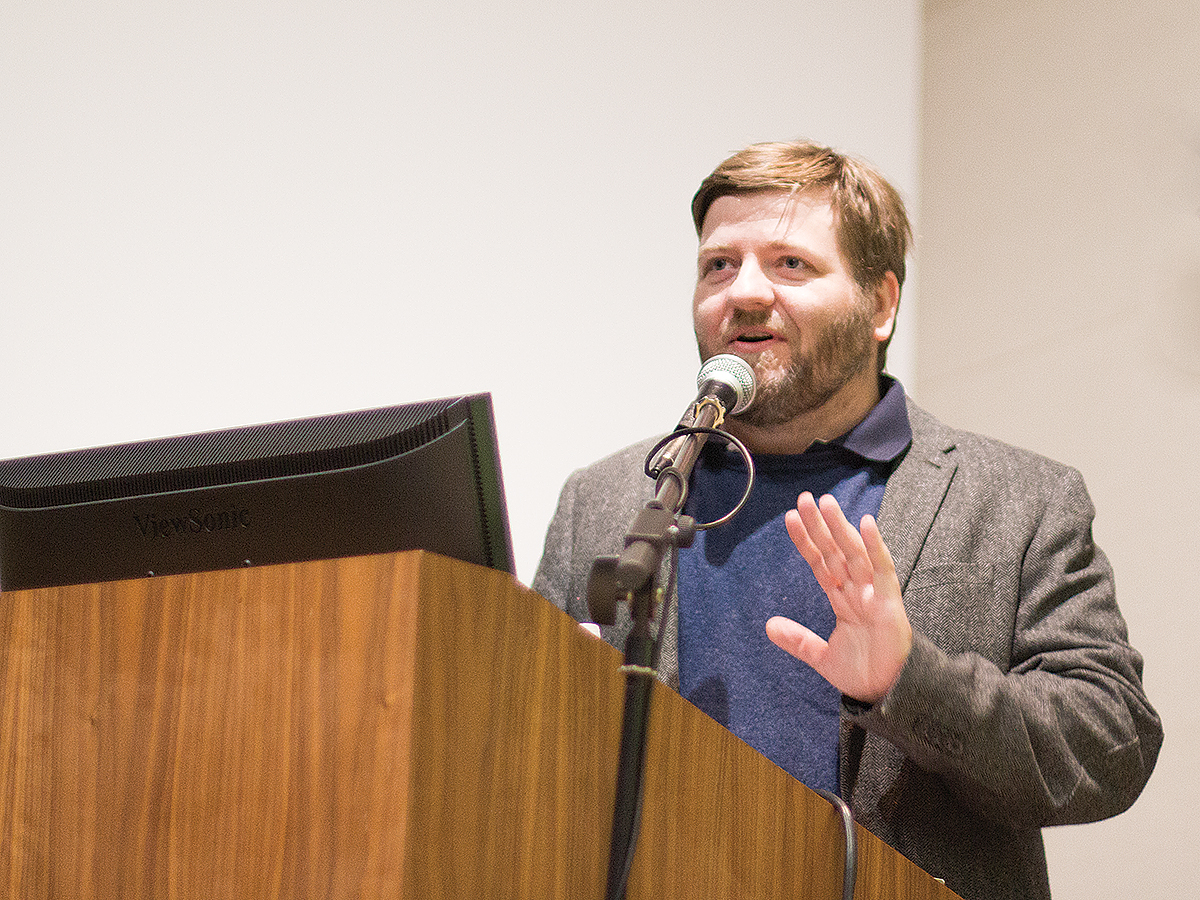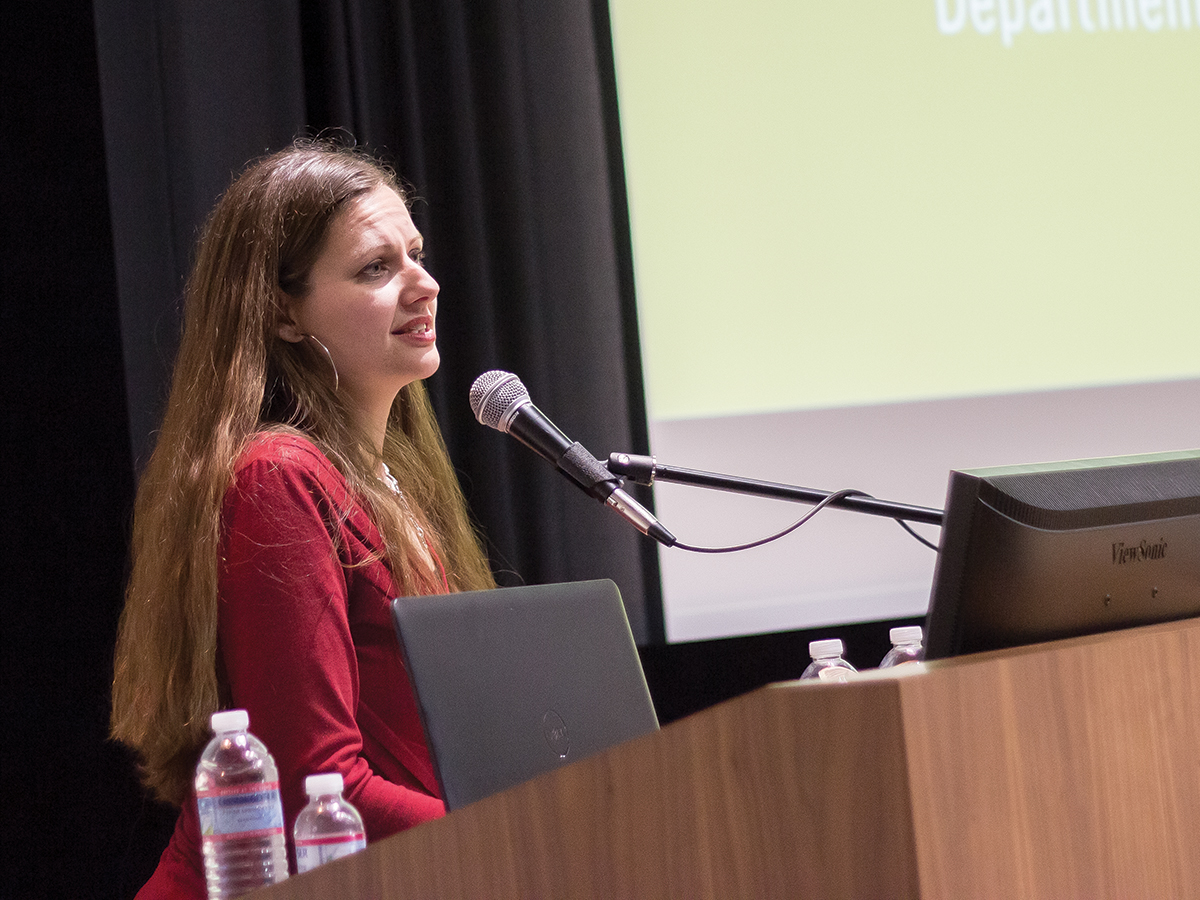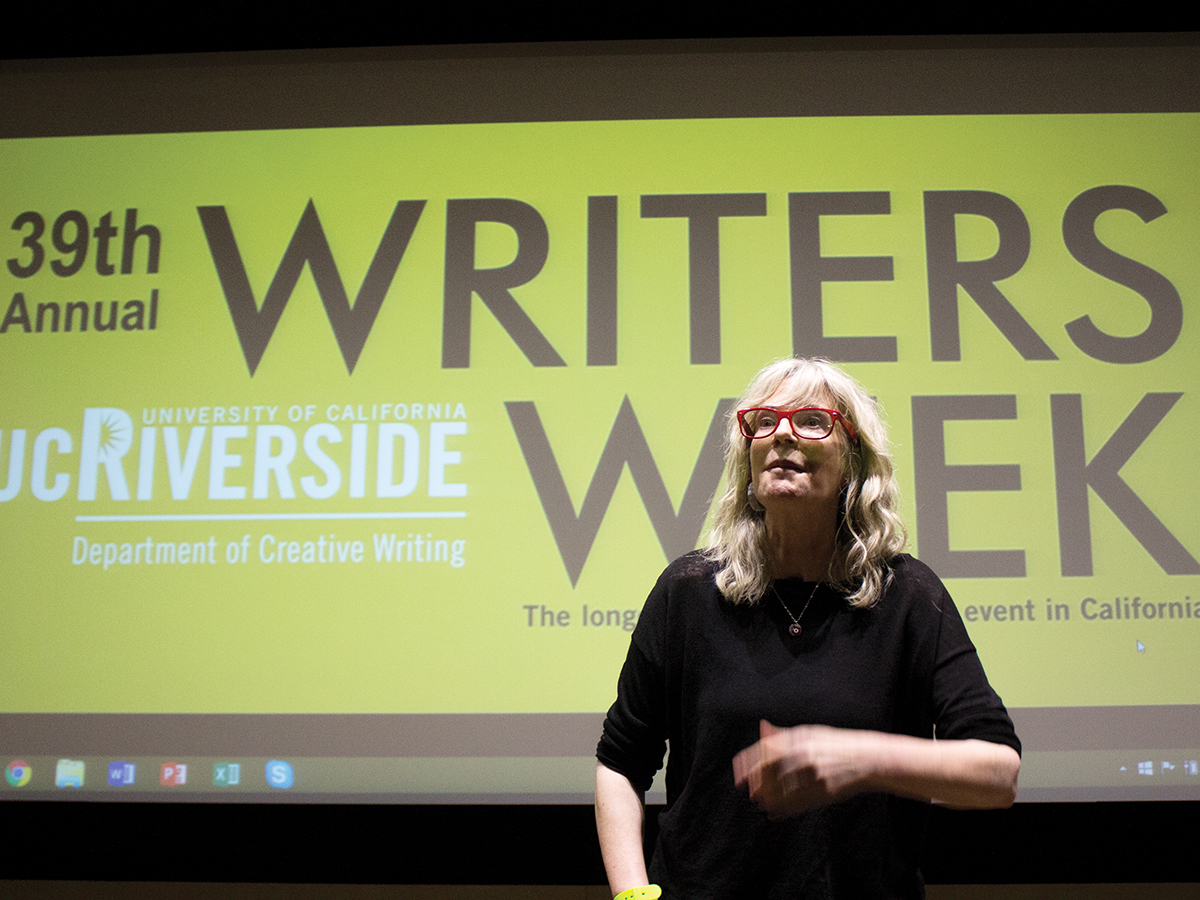
TUESDAY:
Cory Doctorow (Tiffany Liaw, SSW)
“I’m a science fiction writer and a semi-pretend computer scientist,” began Cory Doctorow, the first author to kick off the start of Writer’s Week 2016. As an activist and the co-editor of the blog “Boing Boing,” Doctorow announced to the eager crowd to think of the world we live in today relating to the “Internet of things,” meaning our society seems to “always looks like something out of Tron, with people in jumpsuits and the kitchen springing to life to make their tea.”
In this technology-driven world, it’s hard to just stop and think about the cost of having convenience at our fingertips. “The world is woven with computers, but it’s a dreadful idea,” he posed, then explaining that in order to incorporate computers, we have to be able to trust the system that controls the machines. Doctorow then allowed the crowd a moment to ponder over his words as he set up a scenario with a house controlled by gesturing your arms. “Every corner will have to be filled with cameras and microphones for that to work. But the real question is whether or not the cameras and microphones are doing your bidding or someone else’s.”
The intended consequence, as he elaborated, was for companies to control what people do and where people go; and frankly, we are all falling into the trap. However, there’s still hope, as Doctorow shares: “The people of today have to take action. If you’re not on the side fighting censorship, you’re on the wrong side.”
David Campos, Angela Penaredondo and Kenji Liu (Myles Andrews-Duve, SSW)
In the midst of his reading of “Drought Garden,” poet David Campos opined, “I’ve always liked rules.” A true irony considering that the poem, which drew parallels between the decay of a drought-afflicted lemon tree and the overall negligence of American society, set forth an extemporaneous hour of poetry in which the featured writers — Campos, Angela Penaredondo and Kenji Liu — tossed any formal rules of presentation aside.
The group took an impromptu approach to the reading, jovially bouncing ideas off one another with the unassuming spontaneity of a child attacking their first training wheel-free bike ride. The journey commenced with Campos’ aforementioned piece, which uncoiled a thematic pathway ridden with motifs of growth and nature, before Penaredondo’s “To One’s Flesh” — a poem dedicated to the victims of Typhoon Haiyan, which devastated the Philippines in 2013 — invoked a successive trio of heartfelt elegies.
From there, the three took turns testing societal norms, each drawing inspiration from a few poems that challenged the worth of social institutions, questioned the meaning of love and derailed the traditional concept of manhood in America, all of which was to the ultimate pleasure of an intimate, captivated audience.
A standout line from the evening came from Liu’s “Letter to Myself,” a nourishing reflection upon the ambiguity of his status as a 1.5-generation Japanese-born Taiwanese American expatriate. “Injured by routine,” he described himself. The line not only sparked the group’s newest run of inspiration, but aptly revealed their underlying goal for the afternoon — to unveil their exceptional work gratuitously whilst leaving routine behind and emerging equal parts fulfilled and unscathed.
Brenda Cardenas, Matt Lippmann and Gabrielle Calvocoressi (Christal Mims, SSW)
Poets Brenda Cardenas, Matt Lippmann and Gabrielle Calvocoressi treated a small audience to a roundtable poetry reading of some of their most famous and intriguing pieces of work. Filled with social commentary, love and pain, the poetry of the three writers expressed the often suppressed but undeniable emotional ties all people have to the world within and around them.
Finalist for the LA Times Book Award, Calvocoressi is a poetry editor for the Los Angeles Review of Books and also teaches at the University of North Carolina. Her poetry often draws from nature to describe growth, loss and the overall human condition. “Most days I’m happy to be alive and then there are days when I’m happier than most and this feels like one of those days, to just be with all these poems,” Calvocoressi expressed.
Cardenas, a professor of English at the University of Wisconsin-Milwaukee, has written a numerous amount of anthologies and journals while infusing both English and Spanish in her poetry. Much of her work is inspired by the lives and stories of other artists and communities. She gave a brief description of Cuban American painter and performance artist Ana Mendieta before reading a poem called “Nexus,” inspired by Mendieta’s “Silueta” series.
Lippmann’s poetry stemmed from occurrences that take place in his everyday life, from his job as a high school teacher to caring for his young daughters. “Being a parent is sometimes, very gross,” he explained to a chuckling crowd. “Or you have to do gross things.” Lippmann continued with his poem “Fishing” in which he described digging his daughter’s retainer out of his car and yanking out her loose tooth.
After an hour of poetry, the talk came to a close with a group hug between the three panelists and smiles throughout the crowd.
Amy Uyematsu and Harmony Holiday (Robert Lees, SSW)
For one of the last events in the day, poets Amy Uyematsu and Harmony Holiday read some of their published pieces as well as a few gems from upcoming books.
Though Uyematsu was on the docket of performers from the beginning, Holiday was unannounced for this session, as the originally scheduled poets were absent. Her poetry readings showed her roots, mixing motifs of drug abuse, sex, domestic abuse and African-American icons, her breathless pace featuring the cadence and intricacies of a jazz quartet. Her loquaciousness was a foil to Uyematsu, who read minimalist poetry at a slow pace, each word hanging between the pauses that surrounded it.
The two traded back and forth for most of an hour, with the best pieces of the reading being Uyematsu’s series of haikus and Holiday’s “Forensics Outside of Miles Davis’ Jail Cell.” The reading finished with a brief Q-and-A in which the two answered questions about their respective creative processes and their inspirations. On my way out, I made sure to grab a copy of Uyematsu’s “The Yellow Door.”
Li-Young Lee, Barbara Jane Reyes and Juan Felipe Herrera (Kyle Omori, CW)
Barbara Jane Reyes, Li-Young Lee and the Poet Laureate of the United States, Juan Felipe Herrera read poems about humanity and the power we have through poetry and our fears in reading and writing it.
Reyes is known for her work on spirituality, the female body and social media and spoke about the struggles of being a woman and of being told to become “a lady.” She believes that conceding to the stereotypical ideals of becoming a lady is the equivalent of feeding yourself to others.
Lee spoke about the fear that we feel in poetry. He talked about how there are poems that we are afraid of because we don’t know what we’re trying to write about and we’re afraid of what we are capable of by writing. He read excerpts from his work in erotic poetry and how we can connect the erotic with the purity of spirituality without it being contradictory.
Juan Felipe Herrera interspersed his stories of being declared the poet laureate with bursts of harmonica playing and poems of and for those who cannot speak for themselves. There was a call to action in his work that everyone in the crowd acknowledged with reverence.
All three of these poets were resolute in their beliefs of equality and freedom of expression. But even though their overall message was serious, they managed to keep the tone of the panel light with their banter.

WEDNESDAY:
Colin Dickey (Janine Lano, CW)
As a few straggling audience members took their seats, the emcee stepped up to the podium and announced the next writer, Colin Dickey. Eyes flew forward when Dickey, a nonfiction writer who has written for the Los Angeles Review and a novel titled “Afterlives of the Saints,” greeted the audience with a warm welcome.
Dickey’s passion for writing comes through a nonfiction storytelling of research that center around ghosts and death. He read a short piece titled “Uphousing” which became the catalyst for his book coming out in October that tells the stories of America’s cultural history of haunted houses and hotels. Reading the piece quickly yet passionately, he turned what would be a research paper on haunted houses into a story, making the audience sit up a little more.
His interest and knowledge in death and anything ghost-related made the crowd think he believed in the supernatural. But when an audience member asked if he did, he chuckled and revealed that he did not saying, “My agent says I should keep that under wraps,” and everyone joined in with his laughter. Dickey admits that he only cares about why these stories matter to people; not about whether or not anything is haunted. Dickey made the subjects of death and ghosts come to life and was a great ending to the nonfiction writers for the day.
Carolina De Robertis (Nathan Swift, SSW)
Carolina De Robertis opened with her new novel “The Gods of Tango.” A writer of Uruguayan origin who grew up in England, Switzerland and California, Robertis worked at various women’s rights organizations for 10 years. Robertis spoke about quilombos, which are villages founded by slaves who escaped from Brazil to Uruguay. In these hut villages, escaped slaves would resuscitate their culture and languages through dance, which would become important to the history of tango.
Robertis’ research into her novel concerned itself with the great migration of immigrants to Argentina and Uruguay from the turn of the 20th century. “This had a huge impact on the culture there,” Robertis explained, “and in particular, the way in which this phenomenon of immigration of collision between cultures … came together to create something new on the margins of culture.” That something new was tango.
Robertis’ reading was concerned with the novel’s 17-year-old female protagonist, Leda, an immigrant from Italy, who intends to marry her cousin. However, her cousin dies, and she’s left alone Buenos Aires, where she’s exposed to tango. Placing the story in 1913, when the tango was just beginning to gain prominence among the upper classes, Leda disguises herself as “Dante” in order to participate in the local tango scene, and discovers her attraction to women, as well as insight into the political details and ramifications surrounding tango.
From this, Robertis is able to explore the complex relationship between tango and gender, passion and the erotic. An astonishing amount of research went into the novel’s making, as Robertis pieced together where she had to look for her research: “Most of the texts I looked at have not been translated to English. I did a lot of digging.”
The audience walked away with a better understanding of tango and its rich, multicultural history.
Darryl Pinckney (Janine Lano, CW)
Wearing a professional and sharp dark gray suit, Darryl Pinckney, a well-known novelist, playwright and essayist, took the stage next. With a soft and gentle voice that calmed the chattering crowd, he opened with, “I’m very nervous. I might faint,” which caused a gentle wave of laughter. He wasted no time, jumping into a passage from his newest novel “Black Deutschland,” which follows a gay African-American youth that flees the city of Chicago and resides in Berlin, Germany.
Upon finishing, he looked up and faced the audience, jumping back slightly, jokingly saying, “You’re still here?” He spoke of Berlin and how he lived there for research and how it was a place of liberation for him and many other youths. Being a gay African-American himself, the struggles he faced are reflected through the narrator in his novel. When it was time for the Q-and-A session, a gentleman asked if he always wanted to be a writer. Pinckney responded with, “Always. Always wanted to be a writer.” He described his career as being “very lucky” and that he owed his writing life to his parents. Pinkney ended with a reminder to write what you are passionate about and that writing is “an award within itself” — his words inspiring those in attendance.
Daniel Jose Older (Kate Rusmiselle, CW)
Daniel Jose Older is a good reader. So good in fact, that an audience member asked during the Q-and-A if his books were on Audible (they are). Not only did he use different voices for his characters (the little kids’ voices were particularly an audience favorite), but he got involved with the material, using enthusiastic hand gestures to emphasize a point or explain a scene. As he read from “Midnight Taxi Tango,” the second novel of his science fiction series “Bone Street Rumba,” he had us laughing as profanity-laced protagonist Carlos navigates the world. He gives credit to his storytelling ability to his time as a paramedic for 10 years, swearing that paramedics are great storytellers because they swap stories of that day’s patients.
Describing “Midnight Taxi Tango” as a “Brooklyn book plus ghosts,” Older told us that if he had to choose, he would say that he is writing for African-Americans, who aren’t usually represented in science fiction. He named Junot Diaz as one of his inspirations. Another reason he writes science fiction is because he wants to take the genre back to seeing ghosts as spiritual guides, rather than something evil we should be afraid of, which is popular in our culture today.
Walter Mosley (Christal Mims, SSW)
American novelist Walter Mosley shed light on writing novels, the publication industry and the current and future state of writing for a large and intrigued crowd. “It’s good to be here with you guys,” he said. “I haven’t been in Riverside for more than half a century. When I was here it was mostly dirt roads,” he reminisced. Mosley acknowledged the importance of books and the ability that they have to teach the writer about themselves as well as inform and transform the lives of others.
He made it a point to reiterate the fact that capitalism and business is a large part of the writing industry. “When a publisher says that they want to brand you, they mean sticking a hot poker up your ass so that everyone will know by the bloody scar on your rectum who and what you are,” Mosley explained — but he had a rallying call for all writers in the room. “Our stories are our duty and any person, corporation or economic system that gets in the way must be obviated or defeated. We must meet and defeat any critic that tries to silence us, any political movement that says we don’t have to write,” Mosley said.
The award-winning author continued by joking about his seemingly inescapable classification as a mystery writer and also answered a few questions during a Q-and-A before leaving the now well-informed and inspired audience.
THURSDAY:
Stephanie Hammer (Nathan Swift, SSW)
Thursday for Writer’s Week kicked off with Stephanie Hammer, who opened with how exciting it was to be an author chosen for the specific occasion. “It was always my dream to be a writer for Writer’s Week,” she explained, “So now I get to be here with you.”
Hammer presented a love for speaking and writing about the eccentric in life — even up to how she arranged her readings, which were a poem, a section of a novel and another poem, if time permitted. “You want to read your best thing first, your weird thing in the middle, and then finish with your second best thing,” Hammer said, to laughter in the room.
Her best thing, “Woman to Woman,” was a prose poem concerning “mostly true stories” about strange interactions between a speaker and other women who continually stomped off for a dizzying number of reasons, which ranged from believing the speaker was a terrible mother, to becoming offended because the speaker said “penis” when attempting to explain why her young daughter was laughing at a classmate at a swimming pool (it was her first time seeing a penis).
Hammer next read a bit from her MFA thesis “The Puppet Turners of Narrow Interior,” which concerned itself with poetic magical realism and a goth girl who actually isn’t goth, but merely lived on Gothic Street. Running low on time, Hammer skipped reading her second best thing and went right to the Q-and-A session, which was just as strange, quirky and heartfelt as her writing; at one point, Hammer mentioned “I’m 61, I’ve published two books in the past two years because I got really scared about turning 60, so there’s nothing like getting older and being afraid of dying and going ‘oh my god, I better do it!’”
Piotr Florczyk (Nathan Swift, SSW)
Jumping right into the next session of Writer’s Week was the Polish-born (Krakow, to be specific) poet Piotr Florczyk, whose readings and Q-and-A session were marked by dry, sardonic humor. Regarding himself as both a poet and a translator of Polish literature, Florczyk opened up by reading from the Nobel Prize-winning Polish poet Wislawa Szymborska. It was a strange type of prose: Szymborska worked as a literary editor at a Krakow magazine, when literary editors published their responses to submissions.
Florczyk read several of her printed responses, which included a poem rejection that stated “We have a rule: that all poems about spring are automatically disqualified. This topic has ceased to exist in poetry. In life, of course, it still exists, but those are two different things.” Another read, “I apologize in advance for the spelling errors. They’re there because I rush greatly when creating a clean draft.”
Florczyk next read from his latest poetry collection “Los Angeles Sketchbook,” which he defined as a collection of personal impressions and observations regarding his childhood in Poland, as well as his contemporary visits to his home country. “Sleepless in Santa Monica,” which immediately opened up with “As I’m writing this, two people are talking about having sex, that much is clear, and then proceed to turn their beautiful words into actions,” and goes into the autobiographical speaker’s conflict between how much he should adapt to his new country and life, ending on “‘Goodbye,’ rather than ‘see you later,’ is my favorite phrase.”
Florczyk answered questions regarding his upbringing and the unique life he’s been granted as a Polish-born writer who only writes and publishes in English. He explained how he learned English when he arrived in America in 1994 at age 16. “I did my freshman year of high school in Poland, and then the summer between my freshman and sophomore years is when I moved to Mission Viejo,” Florczyk said.
“I’d rather not be labeled as a ‘Polish’ or ‘Polish-American’ writer, even though I am through name and accent and my use of American English,” Florczyk explained. “I’ve always tried to … tell stories that matter to me, and hopefully to everybody else at the same time.”
Karolina Waclawiak (Cody Nguyen, SSW)
Thursday’s series of lectures continued with an appearance by Karolina Waclawiak — a LA-based author of two novels, and the deputy culture editor at Buzzfeed. Upon taking the stage, Waclawiak wasted no time in introducing her latest book “The Invaders,” which tells the story of, in her own words, an aging trophy wife named Cheryl and her pill-popping, kicked out of college stepson Teddy over the course of a summer in an upper-class Connecticut suburb.
After setting the story’s canvas, Waclawiak began to recite two rather lengthy excerpts from the book — one from each character’s point of view, before opening the room for a Q-and-A session. In the session, Waclawiak shed light on topics ranging from the inspiration behind “The Invaders,” to her writing style — which consists of staggered writing sessions with varying length. Waclawiak states that at times, she could go “as much as two weeks” without writing anything. Addressing another question from the audience, Waclawiak touted another element of her approach to writing — an ad-hoc method with no outlines or predetermined plot elements when authoring a book, stating that “I like to let my characters take me on a journey as I’m writing … you shouldn’t know where the book’s going to end … or you’re bored before you start.”
Parnaz Foroutan (Robert Lees, SSW)
“When he (John Steinbeck) describes California, you can smell the sage, you can feel the heat.”
Parnaz Foroutan made this statement in an attempt to explain her design process behind her first book “The Girl from the Garden,” a story told from the eyes of a woman slipping into dementia. The story being told is simple: A man can’t father children, so his younger brother gives him his own son, leaving the mother heartbroken. However, rather than telling the story in a traditional narrative style, Foroutan decided to use the frame of a suffering woman to capture the “magic of experience” that comes from life and memory.
While not academically trained and with only one published work under her belt, Foroutan captivated the audience on Thursday, regaling the audience with excerpts from her own work while explaining the insane amount of detail that went into her first book, including 10 years of research and six years spent mastering her unique style of syntax and sentence structure.
She talked about how she writes from experience, as her book’s narrative draws from her own life as well as stories she heard growing up. Describing her desire to become a storyteller, Foroutan acknowledged that she always knew she would be a storyteller ever since she sat in a psychology lecture at UC Berkeley “100 years ago.”
Her presentation was memorable and inspiring, as Foroutan’s success shows that independent artists, with enough talent, can get their work published and noticed. She also dispensed invaluable advice for any recently published authors: Stay away from the reviews section of Goodreads.
Viet Thanh Nguyen (Kate Rusmiselle, CW)
In a voice reminiscent of HAL, the supercomputer from the movie “2001: A Space Odyssey,” Viet Thanh Nguyen read a passage from his upcoming novel, “Nothing Ever Dies: Vietnam and the Memory of War,” a self-described “angry book” where Hollywood is likened to Nazis.
In the passage he read, the protagonist is a consultant for a Vietnam War movie. He goes to the oeuvre (a fancy French word for “artist”) requesting that the Vietnamese people in the movie are given speaking roles. The oeuvre retorts in disgust, condescendingly asking the protagonist whether he has directed any successful Hollywood films. When the protagonist admits to none, the oeuvre tells him to get the hell out of his house.
The lack of minority characters in Hollywood films was heavily discussed during the Q-and-A. While applauding literature for the awareness it brings to social issues, Nguyen firmly believes that getting more minority characters in Hollywood films will result from change within the Hollywood industry, not outside of it. Sadly, Nguyen remarked, change happens slowly in America.
While some Americans may see his book as anti-American for its unapologetic view of U.S. involvement in the war, Nguyen is hopeful that his book will be received well in Vietnam, where it is currently being translated.









